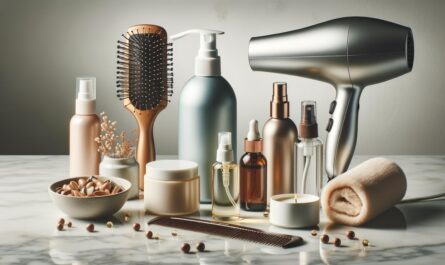Niacinamide Benefits for Hair
Niacinamide, a water-soluble form of Vitamin B3, offers multiple benefits for hair health. It hydrates the scalp, combating dryness and creating a healthy environment for hair growth. By promoting protein synthesis, niacinamide strengthens hair strands, helping to fight thinning and loss.
As a soothing agent, niacinamide calms the scalp and reduces irritation, making it beneficial for conditions like dandruff or eczema. It also enhances blood flow to the scalp, ensuring hair follicles receive necessary oxygen and nutrients for healthy growth.
Scientific evidence supports these benefits. A study titled "A Novel Cosmetic Approach to Treat Thinning Hair" found that niacinamide improved hair strand thickness and elasticity, resulting in fuller and more youthful-looking hair.

Collagen's Role in Hair Health
Collagen is a vital protein for hair health, providing essential amino acids used to build keratin, the protein that forms hair. It also protects hair follicles from damage by acting as an antioxidant, fighting free radicals that can weaken strands.
By supporting the integrity of the dermis, where hair roots reside, collagen helps prevent hair follicle degeneration that leads to thinning. It may also slow down the graying process by neutralizing free radicals that can damage melanin-producing cells.
Scientific evidence supports collagen's hair benefits. Studies have shown that collagen supplements can improve skin elasticity and hydration, indirectly benefiting hair by maintaining a healthy dermis environment.
Consider incorporating collagen into your routine through supplements or nutrient-rich foods to enhance hair health while also benefiting your skin and nails.

Topical vs. Oral Applications
Both topical and oral applications of niacinamide and collagen offer distinct advantages for hair health.
Niacinamide:
- Topical: Provides targeted benefits, directly hydrating the scalp and improving overall scalp health. Look for products with 2-5% niacinamide.
- Oral: Offers systemic benefits, supporting overall health and indirectly promoting hair health.
Collagen:
- Topical: May provide surface-level benefits but struggles to penetrate deeply into the skin.
- Oral: Highly effective, as hydrolyzed collagen is easily absorbed by the body, delivering vital amino acids to hair follicles.
Consider your personal routine and hair care needs when choosing between topical and oral applications. A combination approach can offer comprehensive care:
- Morning: Take an oral collagen supplement.
- Hair wash: Use a niacinamide-infused shampoo and conditioner.
- Evening: Apply a niacinamide serum to your scalp.
- Diet: Include collagen-rich foods in your meals.
Remember, consistency is key for visible improvements. With these ingredients in your hair care routine, you're on your way to achieving healthier, more vibrant hair.

Safety and Side Effects
While niacinamide and collagen offer numerous benefits, it's important to be aware of potential side effects and safety considerations.
Niacinamide:
- Topical: May cause mild redness, itching, or burning, especially for sensitive skin. Start with a lower concentration and increase gradually.
- Oral: Generally safe within the recommended daily allowance (14-16 mg for adults, upper limit 35 mg). High doses can cause digestive issues or, rarely, liver damage.
Collagen:
- Generally well-tolerated, but may cause mild digestive discomfort.
- Recommended dosage: 2.5 to 15 grams per day.
- Check the source if you have food allergies, as collagen often comes from animal sources.
Precautions:
- Pregnant and breastfeeding women should adhere to advised limits.
- Individuals with pre-existing conditions (liver issues, kidney disease, gastrointestinal problems) should consult a healthcare provider before use.
- Those on medications affecting blood pressure or cholesterol should discuss niacinamide use with their doctor.
Always consult a healthcare professional before adding new supplements to your routine, especially if you have underlying health conditions or are taking medications.

Incorporating niacinamide and collagen into your hair care routine offers a comprehensive approach to achieving healthier, more vibrant hair. These ingredients address various hair concerns, from hydration and strength to scalp health and protection against damage. With consistent use and mindful application, you can look forward to the beautiful locks you've always desired.
- Draelos ZD, Jacobson EL, Kim H, et al. A pilot study evaluating the efficacy of topically applied niacin derivatives for treatment of female pattern alopecia. J Cosmet Dermatol. 2005;4(4):258-261.
- Davi MG, Jorgensen C, Galanakis K, et al. A novel cosmetic approach to treat thinning hair. Br J Dermatol. 2011;165 Suppl 3:24-30.
- Noordam R, Gunn DA, Tomlin CC, et al. Both low circulating insulin-like growth factor-1 and high-density lipoprotein cholesterol are associated with hair loss in middle-aged women. Br J Dermatol. 2016;175(4):728-736.
- Gehring W. Nicotinic acid/niacinamide and the skin. J Cosmet Dermatol. 2004;3(2):88-93.
- Umar S, Carter MJ. A Multimodal Hair-Loss Treatment Strategy Using a New Topical Phytoactive Formulation: A Report of Five Cases. Case Rep Dermatol Med. 2021;2021:6659943.




